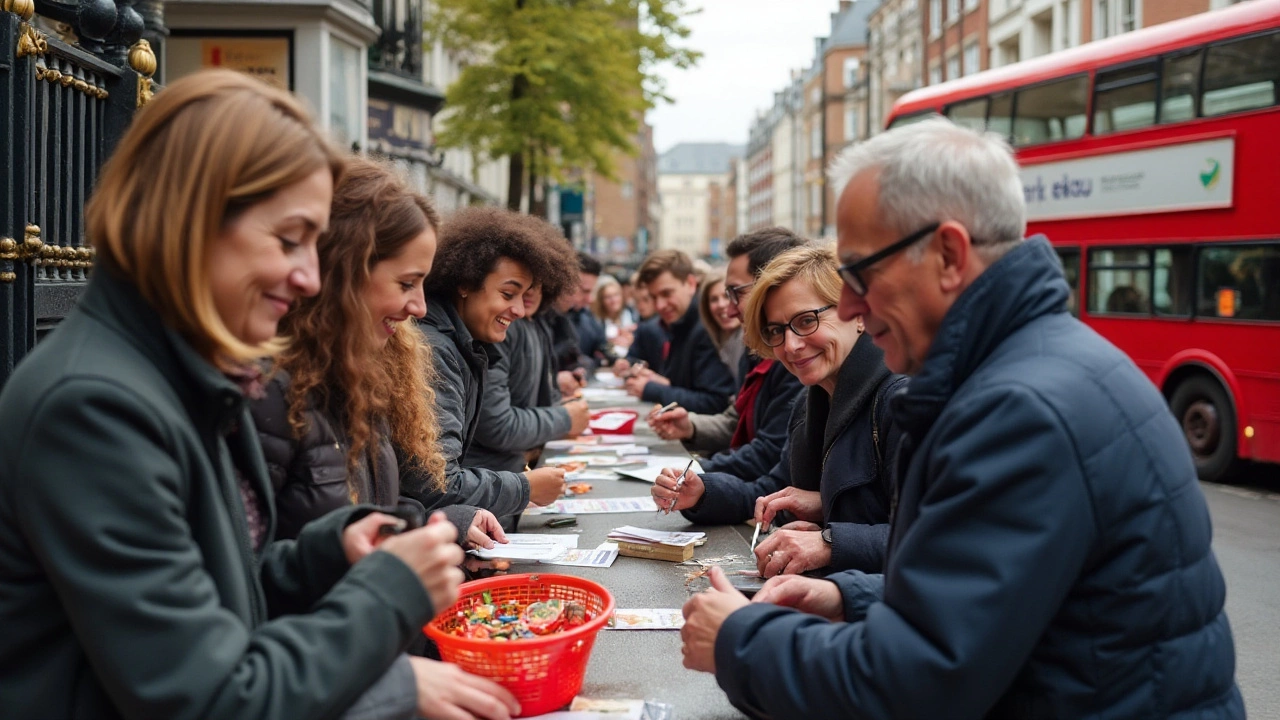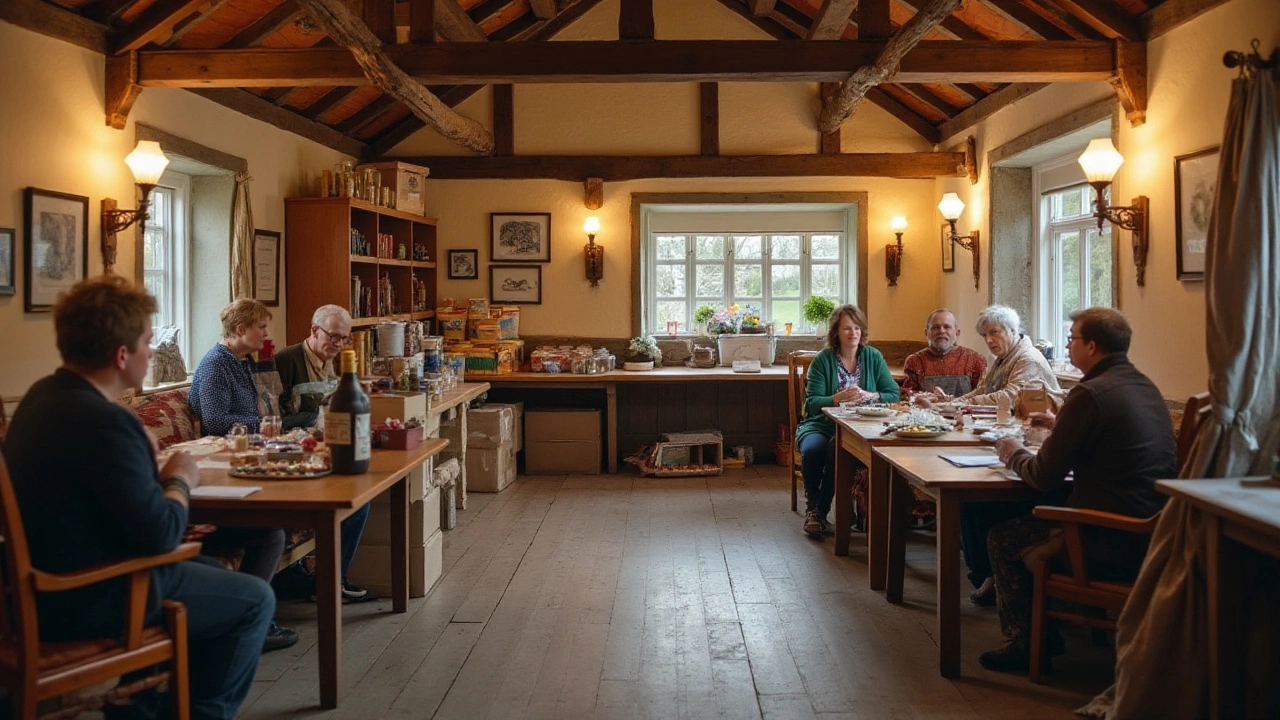Deciding Between Volunteering and Donating: A Guide to Giving Back
When it comes to making a difference in the world, many of us find ourselves pondering the best way to offer our support. Is it through volunteering our time or by donating money?
This choice isn't always straightforward, as both have unique benefits and considerations that can greatly influence the impact you end up making. From personal fulfillment to measurable community change, this conundrum requires thought and a touch of self-reflection.
In this discussion, we pull back the layers on both options, aiming to help you understand what each entails and how you might choose the path that resonates best with your values and possibilities.
- Understanding Volunteering
- The Power of Donations
- Combining Efforts
- Personalizing Your Contribution
- Making a Decision
Understanding Volunteering
Volunteering is a selfless act where individuals dedicate their time and skills to help others without expecting monetary compensation in return. The essence of volunteering lies in its capacity to build a bridge between diverse groups of people who are bound by the common desire to make a positive impact in the world. Many people discover that volunteering allows them to connect with their community while enhancing their sense of purpose. According to the Corporation for National and Community Service, volunteering is linked to lower rates of depression and increased life satisfaction, as people find fulfillment through active engagement in meaningful activities.
One of the distinct advantages of volunteering is the opportunity it provides for personal growth and skill development. As volunteers are exposed to new environments, they often acquire new skills or hone existing ones, which can be invaluable in both personal and professional realms. Engaging in volunteer work can foster networking, offering exposure to different perspectives and new career opportunities. Volunteering can also enhance social skills, as it requires communication and teamwork – qualities that are crucial in today’s interconnected world.
The Varieties of Volunteering
There are several types of volunteering: some involve short-term commitments, such as helping at a local event, while others can be long-term projects requiring a regular time investment, like tutoring students after school. Many organizations, such as Habitat for Humanity, provide structured volunteer opportunities where people can learn new trades while assisting those in need. Alternatively, some may choose to volunteer independently, whether it’s by cleaning local parks or organizing collection drives for homeless shelters. The beauty of volunteering lies in its flexibility; there is likely a scenario that can accommodate any schedule or interest.Margaret Mead, the distinguished cultural anthropologist, once said, “Never doubt that a small group of thoughtful, committed citizens can change the world; indeed, it's the only thing that ever has.” This speaks to the profound influence volunteers can have. Though an individual's contributions may seem small, when combined with the efforts of others, significant change can ensue. Additionally, volunteering exposes participants to people and situations they might not ordinarily encounter, fostering inclusivity and understanding across different societal sectors.
The Power of Donations
In the dynamic world of philanthropy, the act of donating money serves as an incredibly potent instrument for change. Whether you're a seasoned donor or a newcomer to charitable giving, monetary contributions can significantly boost the reach and impact of non-profits and community initiatives. Donations can manifest in diverse forms, from a recurring monthly gift to a one-time contribution, each playing a unique role in an organizational strategy. Such financial support is the backbone for many causes, enabling them to not only maintain their efforts but expand into new areas of need across the globe. The beauty of donating is that it can be tailored to fit your financial situation, allowing for flexibility while still making a profound difference.
The immediate benefit of donations is observed in how quickly funds can be allocated towards critical resources. These can include medication, food supplies, educational materials, or infrastructure improvements. It’s astonishing to note that a relatively small donation can translate into substantial aid that directly enhances lives. Contributions fuel these essential efforts without delay, and because charities often operate with streamlined budgets, every penny is optimized for maximum impact. Interestingly, according to a study by the National Philanthropic Trust, charitable giving reached an estimated total of $480 billion in the United States in 2022, with a significant portion directed towards health and human services. Donating thus becomes not only a personal gesture of goodwill but also a collective force for societal improvement.
"The best way to find yourself is to lose yourself in the service of others." - Mahatma Gandhi
Donations are also a safe bet for those who desire to contribute without the time commitment that volunteering often requires. This can be especially beneficial for individuals with demanding lifestyles where allotting free hours isn't feasible. However, by allocating part of their financial resources, they can still engage with the cause closest to their hearts. Donors thus achieve a sense of participation and fulfillment, knowing they are critical players in the philanthropic field. Furthermore, many organizations offer donors regular updates, highlighting how their contributions have been utilized, which not only ensures transparency but fosters a stronger connection between the donor and the organization.
Donations and Tax Benefits
Another practical aspect of donating is the potential for tax deductions. In numerous countries, individuals who donate to registered charities can offset their taxable income by the amount contributed. This setup not only incentivizes donations but also promotes a culture of giving, where every individual is encouraged to support wider community needs. However, it's essential to familiarize oneself with local laws and regulations regarding charitable deductions, as these vary vastly. By combining both moral and financial incentives, donations merge personal benefit with altruistic goals, creating a win-win scenario.
Nevertheless, while the influence of financial contributions is monumental, responsibility must guide whom and what you choose to support. Conducting thorough research on a charity's background ensures your hard-earned money is advancing reputable efforts. Tools like Charity Navigator provide valuable insights into an organization’s financial health, accountability, and transparency. Thus, an informed donation maximizes the chance of achieving desired outcomes, reinforcing the substantial power of donations as a catalyst for societal betterment.

Combining Efforts
For those looking to maximize their impact, combining both volunteering and donating can offer a balanced and powerful approach to supporting your community. Many organizations rely heavily not only on financial contributions but also on the manpower and skills volunteers provide. Why choose just one when these actions are inherently complementary? Engaging in both can offer a holistic understanding of the needs and challenges faced by a charity or community project. This combination allows you to be involved on multiple levels, enhancing the impact of the funds you're providing while directly seeing the effect on people or environments benefiting from your community service. Imagine understanding the administration and overhead costs associated with running a non-profit and how your donations alleviate that financial load while your time as a volunteer works on the ground level. This dual engagement can be especially rewarding as it fosters a deeper connection with the cause, allowing one to see firsthand the tangible results of any monetary donations made.
Some organizations have increasingly encouraged this integrated approach by establishing programs tailored to those who give both their time and money. This synergy can lead to a more meaningful relationship between the volunteer, the organization, and the cause. Such programs often provide training, ensuring that your volunteering experience is as effective and enjoyable as possible. They might design structured pathways for donors to engage in hands-on work or invite volunteers to contribute financially, recognizing the duality of their contributions. This integration not only amplifies the volunteer's ability to enact change but also often enhances personal satisfaction. Sometimes, participating in charities with a foot in both worlds allows individuals to meet their own desires for purpose and altruism, which studies have linked to increased happiness and a sense of fulfillment.
"The combination of volunteering and donating creates a unique opportunity to witness and influence the holistic development of a cause," says Jane Goodall, celebrated primatologist and anthropologist.
A notable example is the widely-recognized Habitat for Humanity. This organization thrives on combined efforts, where volunteers assist in building affordable housing while financial contributions help subsidize the costs of materials and professional staff. This synergy is powerful—not only do volunteers gain the opportunity to witness the fruits of their labor, but donors can also see how their contributions directly support tangible outcomes like families moving into new homes. This model exemplifies how effectively merging time and resources can propel the success of initiatives aimed at meaningful societal change. Such models serve as inspirations, encouraging others to consider how they can weave giving and volunteering into a more substantial commitment. By investing both resources and time, participants help guarantee the endurance and prosperity of the community programs that depend on these dual contributions.
Personalizing Your Contribution
Deciding how to contribute your part toward a better world can be deeply personal and fulfilling if done mindfully. When choosing between volunteering and donating, it's crucial to contemplate how each aligns with your personal values, skills, and resources. The course you pick can transform the experience from a mere act of charity to a heartening journey. Whether through active involvement in community projects or financial support, the steps you take reflect your unique personality and values. Volunteering offers a hands-on approach, giving you a chance to engage, influence, and understand the communities you wish to help. Likewise, choosing to donate allows you to support causes you're passionate about, possibly extending your influence globally through strategic giving.
Begin by pondering your strengths and how they can serve others. Are you an excellent communicator, an enthusiastic organizer, or do you have technical skills that could lend a hand in administrative tasks? Volunteers often find their niche by using what they're good at, which can make the experience more rewarding and sometimes transformational. An example is, a tech-savvy individual might find joy and fulfillment in volunteering to teach coding skills to underprivileged kids, therefore directly impacting their future career prospects.
"Start where you are. Use what you have. Do what you can." — Arthur Ashe
Meanwhile, if your schedule is tight, donating might suit you better. Within the realm of donations, your personal touch can still shine. Rather than giving a generic sum, you could support projects aligned with your passions or values. Researching organizations and confirming their credibility ensures your monetary contributions are effective and impactful. Think about what causes move you. Is it environmental, educational, or focused on mental health? Your decision could be informed by how these causes resonate with your life and beliefs.
Consider also balancing both options for a blend that fits your lifestyle. Engage in charity events that may only require a few hours a month but are coupled with regular financial donations. A multifaceted approach allows you to leave an indelible mark on your cause of choice while still managing personal commitments and responsibilities.
Recent data has illustrated the growing trend of individuals channeling finances into foundations that span different causes.
| Type of Giving | Percentage Contribution |
|---|---|
| Volunteering | 30% |
| Donating | 50% |
| Combination | 20% |
Ultimately, when personalizing your contribution, the key is to ensure that your choice melds naturally with your life. It's about meaningful integration rather than competing obligations. Remember that whether through giving your time or your treasure, the most important contribution is the one that is truly impactful and genuine. This authenticity in giving not only enriches others' lives but also deeply fulfills your own, making the world a slightly better place, one personal contribution at a time.

Making a Decision
At the crossroads of volunteering and donating, many find themselves weighing options to gauge where their efforts can have the most substantial impact. Some see volunteering as a hands-on approach, offering the tangibility of work that directly serves communities. On the other hand, others may find in donations an effective way to provide essential resources to those who are tailored to managing them efficiently. Understanding that both paths hold immense value equally clarifies this decision-making process for individuals seeking to give back.
When determining which option to pursue, reflecting on personal strengths and constraints is crucial. For those whose schedules leave limited free time, monetary contributions can keep support alive. Simultaneously, if you love engaging directly and are passionate about nurturing relationships, volunteering might align more closely with your interests. Delving into the specifics of an organization can also inform this choice. Research indicates that 67% of millennials prefer to donate to organizations that demonstrate the tangible impact of their contributions.
An essential factor in your decision-making may be the cause you wish to support. Say you are particularly passionate about education. Many organizations require both volunteers to mentor students and donations for purchasing books. Investigating how much of a direct influence your time or money could generate helps form a clearer picture. It’s worth acknowledging, as noted by studies, that people who participate actively tend to feel a greater sense of achievement and contentment.
"The heart of a volunteer is not measured in size but by the depth of the commitment to make a difference in the lives of others." – DeAnn Hollis
Utilising technological tools and platforms can assist in this evaluative process. Websites like VolunteerMatch can connect potential volunteers with opportunities uniquely suited to them. Similarly, platforms like GoFundMe spotlight initiatives needing financial backing. As our digital world advances, accessibility to contributing from home through virtual volunteering or cryptocurrency donations has grown. This evolving landscape creates broader inclusion for anyone wishing to engage at varying levels of capacity.
Ultimately, the decision between giving back through volunteering or donating remains very personal. It’s about finding a balance that complements your lifestyle and circle of influence. Remember, your contribution could change lives, so feel confidence in your choice and embrace the journey. Whichever path you choose, know that your role within this global community strengthens collective efforts toward a better future.
| Option | Pros | Cons |
|---|---|---|
| Volunteering | Direct involvement, Personal growth, Building connections | Time commitment, Physical effort |
| Donating | Flexibility, Resource pooling | Less personal interaction, Requires trust |







